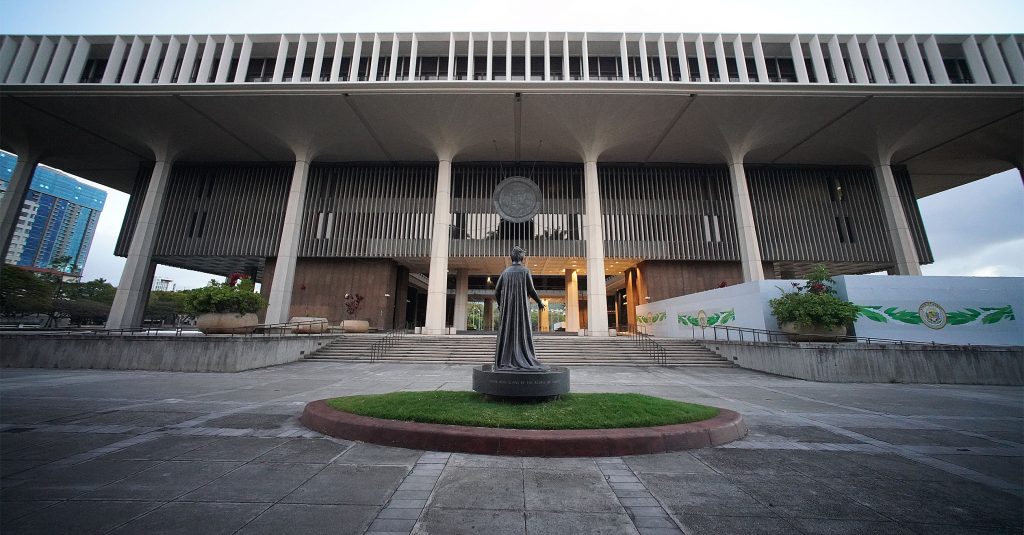Lawmakers also hope to put a question securing same-sex marriage on the ballot this fall.
Lawmakers also hope to put a question securing same-sex marriage on the ballot this fall.
House lawmakers on Tuesday rejected a bill that would have exempted more families from Hawaii’s estate tax, but voted to approve a separate measure to authorize Hawaiian Electric Co. to impose a fee of up to 5% on ratepayers to help the utility manage wildfire risks.
The House also advanced a bill to authorize the counties to regulate or phase out transient vacation rentals, a measure supporters said is urgently needed to increase the supply of affordable housing in Hawaii.
Meanwhile, the state Senate easily approved House Bill 2802, which will ask voters in November to rescind a provision in the Hawaii Constitution that gives the Legislature the authority to limit marriage to opposite-sex couples.
But the Senate rejected a measure Tuesday that would have upgraded the crime of sponsoring or organizing a cockfight from a misdemeanor to a felony. That measure, House Bill 1980, was voted down 16-9.
Those House and Senate votes came as this year’s session approaches the home stretch. Most of the bills approved Tuesday will advance to conference committees later this month, where lawmakers will try to resolve differences between the House and Senate drafts of each bill.
Bills that fail to emerge from those conference committee meetings by the end of this year’s session will die for the year. The session is scheduled to adjourn on May 3.

Lawmakers took up two major tax bills on Tuesday, including a measure to expand the number of people who can be exempted from the inheritance tax, and another bill to provide some state income tax relief to lower-income working families.
The income tax relief bill, which would more than double state taxpayers’ standard deductions, unanimously passed in the Senate with little discussion. That measure would also index state income tax brackets to inflation, a step that will provide additional tax relief in the years ahead.
Senate Bill 3289, which would have exempted more higher-income people from the estate tax, proved to be more controversial. The House shelved that measure in a voice vote after meeting in a closed-door caucus on Tuesday.
House Majority Leader Nadine Nakamura announced after the caucus that the House Democratic majority was recommitting the inheritance tax bill to the House Finance Committee without taking a final vote because the state is facing a range of “fiscal constraints.”
Those include costs associated with the Aug. 8 wildfire, the cost of pandemic hazard pay for public workers, the need to finance affordable housing on Maui, homelessness and the need for mental health services, she said.
Given those fiscal demands this may not be the time to approve the inheritance tax break, Nakamura said. “We need to focus on the immediate needs at hand.”
Critics have said the bill would exclusively benefit the wealthiest 0.2% of Hawaii residents by expanding an existing inheritance tax exemption for spouses to include any immediate family member, including grandchildren.
The state Tax Department calculates that the bill would cost the state $43 million per year in lost tax collections, although some supporters of the measure contend it would actually reduce collections by only about $14 million.
In the Senate, meanwhile, a similar estate tax exemption advanced as House Bill 2653 on a 23-2 vote.
Sen. Donovan Dela Cruz supported the estate tax break, saying said that only 12 states now have estate taxes, and the clear trend is to phase them out nationally.
With the passing of HB 2653, Dela Cruz argued, family businesses like City Mill, ABC Stores Hawaii, Martin & MacArthur and Hawaii National Bank will invest in Hawaii, create jobs and generate more revenue from income, excise and property taxes.
“Public companies, those listed on the stock exchange, don’t pay estate taxes and don’t worry about them,” Dela Cruz said. “Hawaii family businesses are private companies. Unlike public companies, shareholders and family businesses are one. Shareholders are not able to sell their shares easily, so the family business must loan funds to them and sell off parts or all of their businesses to provide funds.”
Sen. Karl Rhoads was one of just two senators voting against the estate tax legislation.
“I’ve introduced several bills over the years to raise taxes on the wealthy and the very wealthy, and this bill goes in the opposite direction,” he said during floor debate Tuesday. “It doesn’t affect anybody if they have an estate smaller than $5.5 million, which is almost no one. And it also gives a tax break to people who are way above that in terms of wealth. So my personal feeling is that we’re going in the wrong direction on this one.”
Opponents of the bill said at a press conference after the vote they will continue to oppose the estate tax measure as approved by the Senate. If the House continues to oppose the estate tax break, HB 2653 will die later in the session.

A bill backed by HECO to impose a fee of up to 5% on ratepayers to help finance the cost of coping with the wildfire risk passed easily in the House Tuesday despite objections from some lawmakers.
HECO has said it plans to use the revenue stream from the new fee that would be authorized by Senate Bill 2922 to finance bonds to pay costs needed to cope with the risk of catastrophic wildfires.
Some of the money from the fee would be used to fund a wildfire mitigation program to prevent future fires, an effort that is expected to cost hundreds of millions of dollars. The Public Utilities Commission would also oversee the mitigation plan.
But Rep. Terez Amato, who represents Kihei, said “this bill does not serve the people of Hawaii. It serves and benefits the HECO shareholders. It is time we stand up for the rights of the middle class.”
Republican Rep. Gene Ward disagreed, telling his colleagues that when Hurricane Iniki destroyed much of Kauai in 1992, “everybody paid for Kauai. Everybody chipped in for Kauai.”
“The point is, if we want HECO to survive, and we don’t want a mainland firm to come and take over, this bill is one of those steps that we need to secure HECO,” he said. The measure passed in a 41-10 House vote.
House lawmakers also approved Senate Bill 2919, which makes it clear the counties have the authority to use their zoning powers to regulate where transient vacation rentals can operate, and also that TVRs can be amortized or phased out by the counties.
That bill was opposed by Republican Rep. Elijah Pierick, who said short-term rentals are “a vibrant part of our economy. Six billion dollars of our economy come through short -term rentals. Forty-eight thousand different jobs in our state come through short-term rentals, and these short-term rentals are mostly owned by local residents.”
But Rep. Lisa Marten, who represents Kailua, said the bill supports “home rule” by the counties.
She said the aftermath of the Maui wildfire exposed just how many housing units there are used as vacation rentals, and are therefore unavailable to residents who need a place to rent for the long term.
“This has been a problem in my community on Oahu for decades,” but state law prevented the counties from getting control of the situation, she said.
“This allows them to implement what they have been trying to do to decrease the number of vacation rentals that are residential homes that have been taken out of residential use and put into resort use at a time when we have a housing crisis,” Marten said.
The House approved the bill in a 45-6 vote, with Republican Reps. Pierick, Ward, David Alcos, Diamond Garcia and Kanani Souza and Democrat Sam Kong voting no.
Supporters of legislation intended to penalize people who harm pets and other animals held a press conference prior to the Senate session Tuesday morning, hoping to influence the outcome of several bills.
Honolulu Police Chief Joe Logan spoke strongly in favor of House Bill 1980, the cockfighting measure, and a related measure on animal cruelty penalties.
“These bills, as they’re written, are hopefully going to deter people from engaging in criminal activity,” he said near the Capitol Rotunda. “You know, dogs are a very important part of people’s lives. Chickens are a very important part of people’s lives, but not for the purposes of fighting. Those are illegal operations. They breed criminal activity.”
The Hawaiian Humane Society was also in favor of the legislation. Stephanie Kendrick, the group’s communications director, said animal cruelty cases tend to be lightly prosecuted.
“And we’re talking about the most serious offenses,” she said. “These are offenses that are either heinous by their nature or result in the death of the animal.”

But Sen. Tim Richards said HB 1980 was too broadly written and would hurt the animal industry at a time when the state is pushing for greater food sustainability.
And Sen. Lynn DeCoite said that House Bill 1580, which would increase penalties for various animal cruelty offenses, could inadvertently harm pet owners, people involved with animal husbandry and ranchers that may use animals in their work.
After the floor votes, Inga Gibson of the Animal Welfare Institute said her organization was “extremely” disappointed.”
“Sen. DeCoite and Sen. Richards misinformed their colleagues that these bills would impact animal agriculture operations,” she said. “Sen. Richards is a veterinarian and he should know better. Sen. DeCoite, however, has long supported cockfighting.”
Another animal cruelty bill, which would prohibit owners from performing surgery on animals, did pass. The surgery would include cesarean sections, ear cropping and tail docking. House Bill 1527 could now be headed to conference committee later this month to work out the Senate’s differences with the House.
A related measure, House Bill 2058, would set up requirements and penalties for owners of dangerous dogs and allow for impoundment of the dogs. It also passed the Senate and now awaits House consideration.
In other Senate floor action, a measure was approved to potentially alter a section of the Hawaii Constitution that has long irked advocates of marriage equality in the islands.
Article 1, Section 23 reserves to the Legislature the authority to define marriage, even as same-sex marriage has been federal law since 2015. A constitutional amendment to limit marriage to opposite-sex couples was approved by a majority of voters in 1998.
Now, more than a quarter century later, voters will be asked whether to repeal that section of the Hawaii Constitution through a constitutional amendment ballot question on Nov. 5. Marriage equality advocates are hopeful, as HB 2802 passed the Senate 24-1 on Tuesday.
“Hawaii faces many challenges this year, led by the ongoing needs of those displaced by the Maui wildfires,” said Jeffrey Hong, chair of the Change 23 Coalition, a group that includes ACLU Hawaii, the Hawaii LGBT Legacy Foundation and the Council for Native Hawaiian Advancement. “With some on the U.S. Supreme Court indicating a willingness to upend marriage equality at the federal level, it’s important for those in our state to ensure that our constitution not be marred by the exclusion embodied in Article 1, Section 23. We look forward to engaging with the people of Hawaii in the months ahead.”
California voters also will consider eliminating their state constitutional prohibition against same-sex marriage in November, while Nevada voters repealed theirs in 2020.
 Sign up for our FREE morning newsletter and face each day more informed.
Sign up for our FREE morning newsletter and face each day more informed.
Civil Beat is a small nonprofit newsroom that provides free content with no paywall. That means readership growth alone can’t sustain our journalism.
The truth is that less than 1% of our monthly readers are financial supporters. To remain a viable business model for local news, we need a higher percentage of readers-turned-donors.


Chad Blair is the politics editor for Civil Beat. You can reach him by email at cblair@civilbeat.org or follow him on Twitter at @chadblairCB.





